Methane belched out by ruminant animals is responsible for 71% of our total agricultural emissions. While there are a number of potential actions to reduce methane emissions, simple and effective solutions are still in high demand.
Meet the founder of Ruminexus, Dr Ghader Bashiri. He is one of the start-ups taking part in our three-month Sprout 2023 Accelerator Cohort X intake.
Ghader is developing new technology that works in the rumen (where methane is produced) to reduce the total amount of methane emitted. While Ruminexus isn’t officially a business yet and is still in the research and development stage, Ghader and his team wanted to do the Accelerator to get a better understanding of what was ahead of them.
“Sprout has really helped us see things with a different lens and given us some clarity on when we need to start looking at actually creating a company and what we need to be thinking about. Academia is very driven by the cool science and the unknowns. In the business world, you really have to have a good understanding of the problem to help ensure you’re preparing the right solution for the market,” said Ghader.
Ghader is a biochemist by trade and is a Senior Lecturer at the University of Auckland. His research laboratory at the University enables him to pursue his academic interests in the microbial world. Dr Sisley and Dr Kimberlee Jordan from UniServices join the team to lend their expertise in commercialisation.
“Reducing methane emissions is the key problem we are trying to solve. I mainly do biomedical research, and the idea for this project on methane mitigation came through my work on tuberculosis. It was a bit of an unusual way to go from pathogens to methanogens but it's worked quite well so far.”
The name Ruminexus, which Ghader admits will likely change once they take their next steps to become a company, came not out of a brainstorming session (although they did have one, none of the names could be agreed upon) but ChatGPT.
The pandemic provided some challenges to the beginning phases of Ghader’s research and he lost 6-months of laboratory time during the second round of lockdowns which delayed progress.
“I also have a day job so the work I do on the start-up is on top of that. It means I have to prioritise things which often means giving up personal or family time. I’m almost always sleep-deprived, but it’s something I want to do, so I don’t mind,” he jokes.
When talking about the ‘aha’ moments he’s had in his journey so far, he said that recent results, which have shown the mode of action of some of the compounds he’s looking at, have been really exciting and have encouraged him along that bit further.
“We’ve also had some wonderful advice which has given us a good perspective on when we need to look at shifting away from the University and start becoming a company. I was worried that perhaps we were doing this Accelerator a bit too early, but I think it’s been exactly what we needed.”
Looking back, Ghader said he wishes he had started earlier and pushed harder to get more funding and investment into his idea to give the project more momentum but perhaps from a timing perspective, things have worked out better.
“With the weather events of this year, more people have climate change at the forefront of their minds, so from that perspective, we’re probably in quite a good position right now.”



